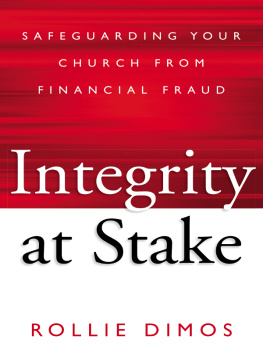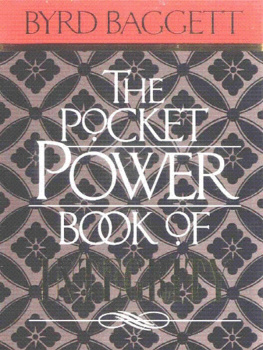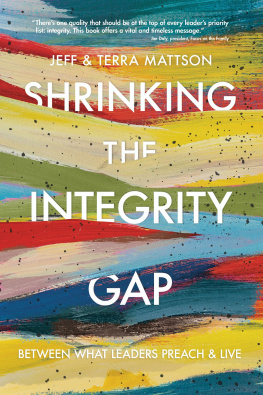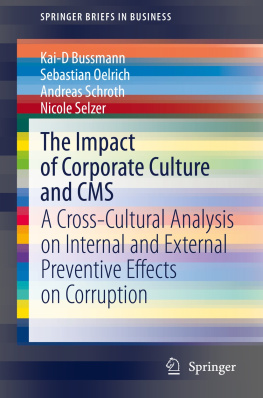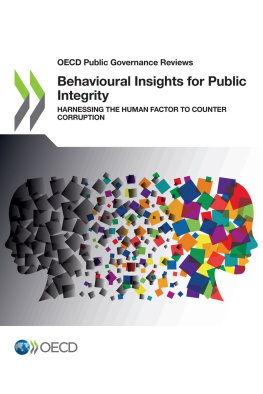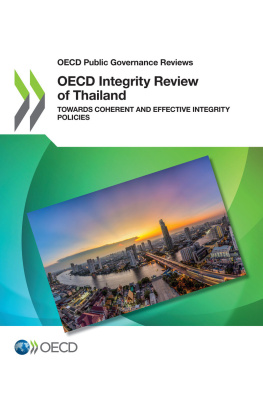INTEGRITY
Integrity
Doing the Right Thing for the Right Reason
BARBARA KILLINGER, Ph. D.
Second Edition

McGill-Queens University Press 2010
ISBN 978-0-7735-3752-1
Legal deposit first quarter 2010
Bibliothque nationale du Qubec
First edition published 2007
Printed in Canada on acid-free paper that is 100% ancient forest free (100% post-consumer recycled), processed chlorine free
McGill-Queens University Press acknowledges the support of the Canada Council for the Arts for our publishing program. We also acknowledge the financial support of the Government of Canada through the Book Publishing Industry Development Program (BPIDP) for our publishing activities.
Library and Archives Canada Cataloguing in Publication
Killinger, Barbara
Integrity: doing the right thing for the right reason / Barbara
Killinger.
Includes bibliographical references and index.
ISBN 978-0-7735-3752-1
1. Integrity. I. Title.
BJ1533.I58K54 2010 179.9 C2007-902836-5
Lyrics quoted on page 1789 are taken from Into the Woods, music and lyrics by STEPHEN SONDHEIM and JAMES LAPINE, 1988 RILTING MUSIC, INC. All rights administered by WB MUSIC CORP. All rights reserved. Used by permission of ALFRED PUBLISHING CO., INC.
Typeset by Jay Tee Graphics Ltd. in 10.5/13 New Baskerville
In memory of our much loved parents, Eva and Cuyler Henderson, who were inspirational role models for integrity, unconditional love, and compassion
Contents
Preface to the Second Edition
Our response to the fear and insecurity that recessionary times create in our lives can bring out the best in our character or overwhelm and feed off our weaknesses the Shadow side of our personality which is in a continual battle with our inner goodness. Will our choices be motivated solely by self-interest or by a genuine, other-directed concern for the plight of our fellow citizens? Will the fear of getting caught keep us honest or will temptation weaken our resolve? Much depends on the integrated depth of our integrity.
In todays world, personal and professional integrity are being put to the test. Two factors of particular concern are a move away from relationships, leading to alienation and impersonal detachment, and the seduction of greed, which is fed not only by stress- related economic and psychological insecurities but by a heightened preoccupation with security itself.
The omnipresent threat of terrorist attacks, exaggerated after the trauma of 9/11, has generalized into paranoid distrust. People are seeking security by deserting sober reality for the thrill of ambitious fantasies. To gain competitive advantage, many are willing to acquire wealth through dubious dealings, by-passing regulatory standards and the rules that keep society as a whole safe. Others succumb to the lure of instant gratification and social pressure to consume, living far beyond their means and amassing crippling debt that creates more economic chaos. The wisdom of restraint is replaced by a belief that more and bigger is always better!
Position, power, and wealth have become ever more desired as institutions throughout the world are being destabilized and hard-won personal savings lost. The culture of narcissism, to use the term that Christopher Lasch coined in the late 1970s to describe society, is todays reality. Narcissistic attributes are revealed in the attention-grabbing cult of personality, with its lure of conspicuous consumption and grandiose lifestyle. Marshall McLuhans predictions and ideas such as the global village and the medium is the message are mainstream now. The ever-changing, take-home, go-anywhere technological wizardry has encouraged not only shortened attention spans but short-term thinking that lacks visionary big picture wisdom.
There is a real and grave danger of public desensitization as shocking media coverage, first met with incredulous disbelief, is followed by an ominous cloud of cynicism. Big news stories about lost integrity and the spectacular falls from grace of many of our corporate, political, and public figures proliferate. While Jeffrey Skillings Enron and Bernie Ebbers WorldCom scandals are old news, more recent pyramid fraud schemers, such as portfolio manager Bernard Madoff, who has been sentenced in the United States, and the alleged criminal acts of financial advisor Earl Jones in Canada, personify real evil. It is shocking to learn how many years these massive Ponzi schemes went on, undiscovered by regulatory bodies. While many of those who dealt with Madoff were wealthy individuals looking for high returns, most of Jones victims were elderly, often critically ill, gullible friends, family members, and colleagues who were charmed by promises of unrealistic, seemingly magical returns on their investments. Even charities, the high-end rich and famous, and respected financial institutions were affected.
Do tough economic times and global recessions lead people to make unfortunate decisions? In his Globe and Mail article Do pink slips lead to prison stripes? Erin Anderssen found conflicting data. Britains Prime Minister Gordon Brown allegedly received a government memo warning of a spiraling social anarchy, and in Canada a national security committee member called for more police to handle one whopper of a crime-breeding recession. In the recessions of 1980 and 1991 national crime rates increased in Britain and the United States, yet to date crime statistics show a decline or only a slight increase. Anderssen found that the factors considered to influence crime rates were full of contradictions. Cited as positive mitigating factors are the increased presence of officers in tough neighbourhoods, an aging population in which the cons just outgrew it, or shared experiences where people realized they were not the only ones in trouble and as a consequence looked after their neighbours. During the Depression crime actually fell in cities where there were effective make-work programs. Negative influences include a rise in alcohol-related assaults due to stress, the vulnerability of young unmarried men without strong social ties who may not have the necessary skills to start anew, wide wage gaps that lead to a sense of frustration and envy, the temptation for low income families to resort to using underground markets, as well as the fear of layoffs which can lead people to inflate insurance and work-related injury claims.
Identity theft, the use of stolen personal information for financial gain, is the fastest growing crime in the world according to RCMP reports, with annual losses to individuals and businesses estimated at more than $2.5 billion. Social insurance, credit cards, bank account numbers including mortgage and loan data that allow for mortgage fraud are obtained by computer hackers and other thieves. (Western Alumni Gazette)
Chris Hedges paints a dire picture of how the fate of democracy may be affected by the loss of integrity. In Empire of Illusion: The End of Literacy and the Triumph of Spectacle, he criticizes corporate managers and government officials for pouring money and resources into established systems, rather than challenging the unfettered capitalism that produced the problems. Government bailouts are being used by corporations for acquisitions and to provide bonuses and dividends for top officials. Hedges predicts that unless the borrowing at the rate of $2 billion a day that has gone on for the last ten years stops, the US dollar will become junk. Citing Lenins belief that the best way to destroy the capitalist system is to debauch its currency, he fears that there will be a loss of confidence in the traditional standards and beliefs that regulate society. The honest and industrious working and middle classes who have lost so much will, he believes, be prey for anti-democratic radical extremist forces who will promise revenge and moral renewal in the cause of national security. The tools are in place, he warns.
Next page

